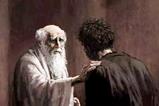Looking for answers? Draw near to the one who gives life it’s meaning, suggests David Instone-Brewer, as he takes a closer look at the book of Ecclesiastes

Sometimes life doesn’t make sense. You save up to buy thoughtful Christmas presents but your gifts aren’t really appreciated. You exercise and eat carefully but you still get ill. You pray faithfully for family and friends but they still make bad choices. So who do you go to for answers? A pastor, a philosopher, a politician?
It was no different three millennia ago when life didn’t make sense to the author of Ecclesiastes, a man known as The Preacher. In response, he decided to conduct a series of thought experiments – and he came to a surprising answer.
The plausibility test
Thought experiments are used by philosophers and scientists to try out new ideas. You think of a series of possible answers to your question and look at the consequences of each one. If any consequence is absurd or obviously wrong, you can rule out that answer. But if an answer seems plausible, it can then be tested to see if it works.
If you’ve started to have trouble hearing what people say, for example, a thought experiment might help you explain why. Is the answer ear wax? No, because you can still hear your neighbour’s music thudding through the wall.
Are people speaking quieter or less clearly than before? No, because a consequence is that everyone is conspiring against you – which is absurd. Could the answer be high-tone hearing loss? This has no absurd consequences or implications, so it’s probably time to have an audiology test to confirm it.
When my children were small, we read the Moomin books together. I was fond of the muskrat, a philosopher character who carried around a book entitled The Meaninglessness of Everything. The Preacher started with the opposite presupposition: there is a meaning to life. So if any possible answer involved a consequence that “everything is vanity” – ie it is “empty” or “meaningless” – it was not the correct one. His thought experiments, however, produced an answer that he almost missed at first.
Searching for meaning
Ecclesiastes is the record of his thought experiments: “I applied my mind to study and to explore by wisdom all that is done under the heavens” (1:13). But time after time his experiments failed, ending with the same absurdity: “Everything is meaningless.” This didn’t put him off – he simply moved on to examine the next possible solution.
The Preacher was most probably Solomon, or someone who put himself in Solomon’s shoes. In chapter 2 he asked whether wisdom and wealth make life meaningful. As a rich king, he could enjoy the party life, implement grand building projects or spend time in cerebral philosophising. But after testing these out, he found they were merely a distraction from the reality of death.
In chapter 3 he tried out a more laid-back philosophy – life is about accepting whatever comes, whenever it comes. But he experienced a divine dissatisfaction because God has “set eternity in the human heart” (3:11). He knew it wasn’t enough.
What about wealth and ambition? Energetically pursuing this proved much more diverting, but it also created new problems: responsibilities, sleeplessness and, ultimately, disappointment. And, in chapter 6, he realised that whether or not you are remembered after you die, you don’t take any of that wealth with you. You leave naked and knackered.
Perhaps life is about playing by the rules? In chapter 8 The Preacher determined to obey the law and carry it out fairly and swiftly. But in the next chapter he discovered that life isn’t fair – winning and success is down to luck (9:11). And in chapter 10 he found out that one small mistake can ruin everything. In the end, the best strategy he came up with was to energetically pursue every opportunity and follow your heart, with no promise of success (chapter 11).
I think he made a mistake. The best answer was actually in chapter 4, and he almost missed it. It was about the importance of family and friends – how they make suffering bearable and wealth meaningful. Although The Preacher realised this, he dismissed it, concluding that when he looked for someone worthy of his friendship (in chapter 7), everyone was flawed. Among the 1,000 people he knew, he discovered only one worthy man and not even one woman (v28)!
It’s a shame someone didn’t point out to Solomon the mistakes in this approach. He would have been much more likely to find a good woman if he hadn’t married 1,000 of them (1 Kings 11:3). And friends are easier to find if you aren’t so self-centred. All of his questions about life concerned what satisfied, pleased or benefitted him.
People first
A friend of mine with Down’s syndrome recently asked if I’d had a good holiday: “Did you meet with any friends?” he enquired. When I explained that we’d been abroad, so didn’t see anyone we knew, he put his hand on my shoulder and said: “Oh, that’s sad.” He has already learned the lesson of Ecclesiastes, that people are more important than things. When all that we own is dust, we and our friends will still remain, in eternity, with God.
In the last chapter, The Preacher recognised this, and points us away from the mere pursuit of a meaning to life. He had been looking for meaning and reward without considering that our few years here on earth are just the canapés before the banquet. We should be getting to know our host.
Having realised this, he wanted to start immediately: “Remember your Creator in the days of your youth” (12:1) – before you need hair dye, walking aids or Viagra (v5: “when the almond tree blossoms and the grasshopper drags itself along and desire no longer is stirred”). Every day we live for ourselves is a day wasted. So live really close to God and you’ll really live.





































No comments yet